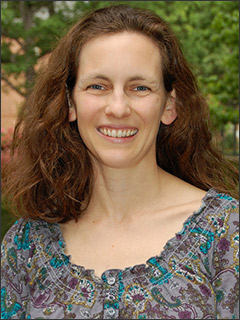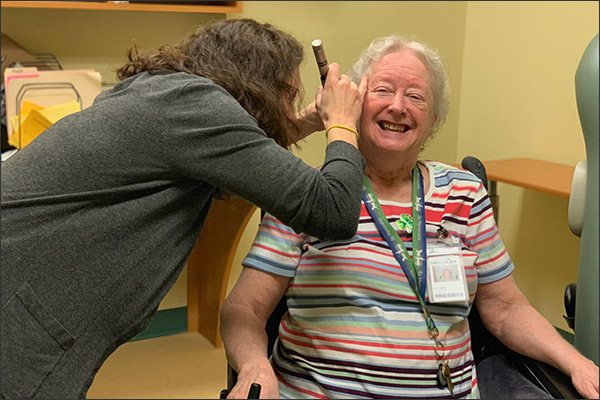2012 New Century Scholars Doctoral Scholarship
Improving Access to Affordable Hearing Healthcare for Older Adults
 When we consider the extraordinary value to people of the best of our scientific research we rarely consider what it costs to achieve that value.
When we consider the extraordinary value to people of the best of our scientific research we rarely consider what it costs to achieve that value.
Sara Mamo knows well that the cost of pursuing an AuD and a PhD (at the University of North Carolina, Chapel Hill), and then a post-doc (at Johns Hopkins University) is long—11 years—and expensive. She needed loans for her AuD and then, thankfully, when the ASHFoundation awarded her a New Century Scholars Doctoral Scholarship in 2012, the funds allowed her to pay off a considerable portion of her student loans. This assistance made her commitment to continuing to pursue her research doctoral degree feel like a good choice and the intellectual credibility it helped establish for her work led to an F (Individual Research Fellowship) award from the National Institutes of Health, which then enabled Mamo to continue on with post-doctoral work without going into further debt. And we all know what a difference a mind free of (at least, most) financial worry can mean to our work.
Mamo, currently an assistant professor in the Department of Communication Disorders at the University of Massachusetts Amherst, is determined to improve access to affordable hearing health care in older adults with age-related hearing loss. She believes that "audiologists must go beyond the technology of testing and fitting hearing aids to thinking more broadly about hearing and functional communication." Aural rehabilitation, based on the recognition and understanding of an individual's communication challenges, she sees as an integral part of audiology. "Audiologists can take an even broader than our current approach to help even more people by assisting them to recognize how hearing loss may be interrupting their lives in a number of ways. We are not just diagnosticians," she continues, "but ‘hearing coaches.' Our job is to go beyond the aids to focus on functional communication and provide guidance to patients to help them become successful amplification users and communicators."
 This audiologist's role is particularly important in this complicated new era of Over the Counter Hearing Devices (OCHDs). Mamo notes that 85% of older adults likely have untreated, and often undiagnosed, hearing loss and could possibly benefit from hearing aids. The easy availability of OCHDs just might get people to start using an aid, Mamo believes, and if some individuals find their OCHD frustrating because they're not getting the relief they expect, the experience could lead them to an audiologist for formal evaluation and intervention. "The OCHDs are here and audiologists," she says, "must begin thinking differently about their role, especially in regard to the newest technology."
This audiologist's role is particularly important in this complicated new era of Over the Counter Hearing Devices (OCHDs). Mamo notes that 85% of older adults likely have untreated, and often undiagnosed, hearing loss and could possibly benefit from hearing aids. The easy availability of OCHDs just might get people to start using an aid, Mamo believes, and if some individuals find their OCHD frustrating because they're not getting the relief they expect, the experience could lead them to an audiologist for formal evaluation and intervention. "The OCHDs are here and audiologists," she says, "must begin thinking differently about their role, especially in regard to the newest technology."
Mamo's plan for her future work combines her interests in access to hearing care and the improvement of functional communication for older adults with hearing loss. This study is part of a K23 NIH Patient-Oriented Mentored Research Career Development Award with Karen Helfer (UMassAmherst), Frank Lin (who mentored Mamo at Johns Hopkins and encouraged her to pursue her passion for community-based public health issues), and Catherine Palmer (University of Pittsburgh). The work will combine laboratory research on functional communication in adults with mild to early-stage cognitive impairments compared to their healthy counterparts and field-based intervention research aimed at providing basic aural rehabilitation for older adults with hearing loss and cognitive impairments in group care settings.
Mamo's 11 years of study provided what would constitute the foundation for her work. "That long education process," she says, "requires encouragement and networking and funding opportunities. The ASHFoundation understands this pathway for promising young scholars and new investigators and, in my personal experience, further understands and supports the functional aspects of communication disorders and ways to help. I'm very grateful to the ASHFoundation for helping to begin my future."
View More Recipient Spotlights